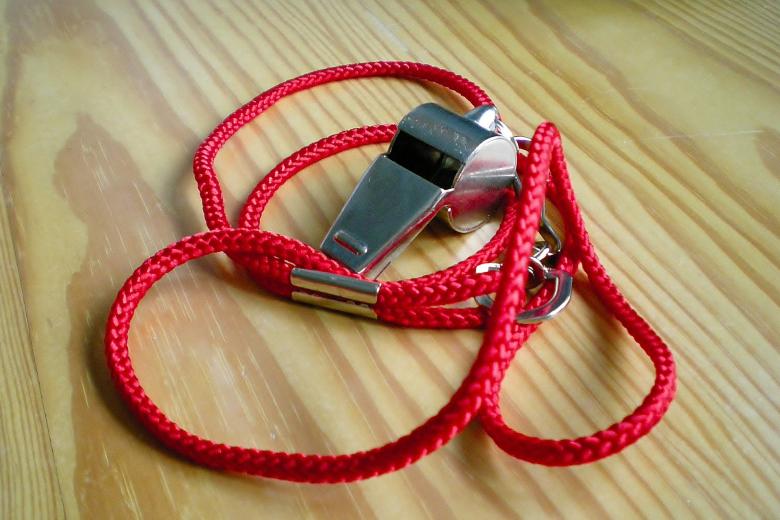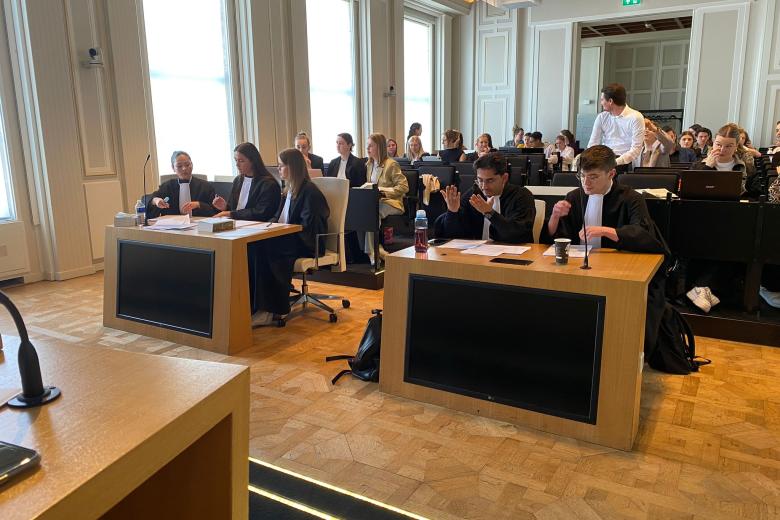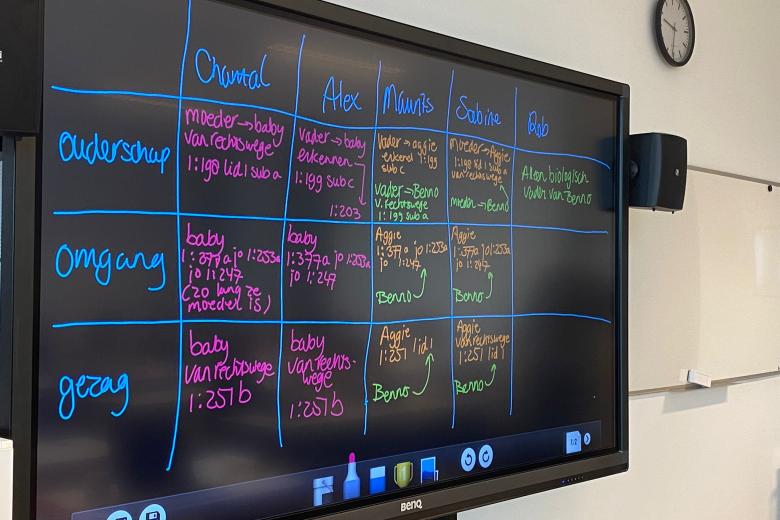Innovative Education in Personal and Family Law
Thanks to the SURF Incentive Scheme for Open and Online Education (still available at the time), Gwen Noteborn (university lecturer in personal and family law at Maastricht University), Claudia Hocks and Janneke Hendrix (lecturers in law at Zuyd University of Applied Sciences) were able to get started on their plan to overhaul the third-year course in Personal and Family Law. The revamped course was introduced last year.
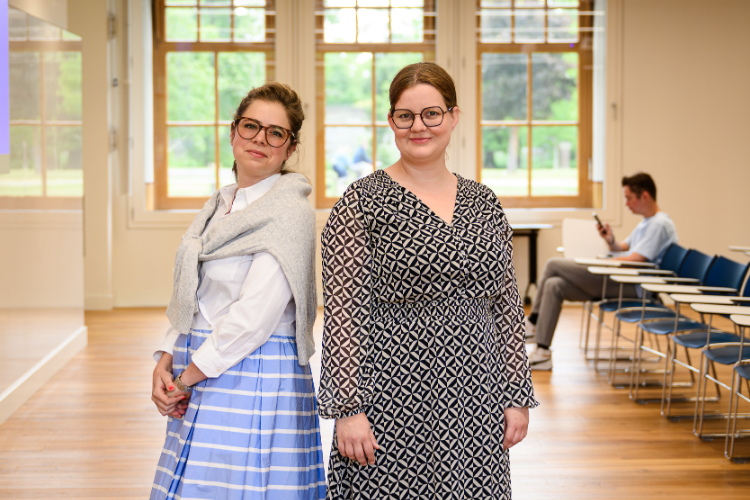
Research by the Ministry of Education showed that students are dissatisfied with the connection between their education and professional practice. Research also showed that the skills that lawyers need are changing under the influence of technology. ‘The subject of Personal and Family Law lends itself to the development of all kinds of other skills, in addition to purely legal knowledge. It's all well and good if you know the law, but in practice things often go a little differently,’ Gwen explains. ‘That is why we wanted to see how we can train the skills needed in such processes. How we can set up a course where, in addition to legal knowledge, you also increase procedural knowledge.’
Real-life simulation as a solution
The idea of simulating a real-life situation arose. For Claudia, this form of education is not new. Various working methods have been interwoven in the education at Zuyd University of Applied Sciences' law programme for some time now. ‘Janneke and I have been teaching a simulation module, The Family Lawyer, for some time now. This elective course is offered twice a year: once in collaboration with Maastricht University and once exclusively within Zuyd University of Applied Sciences. The focus here is not on litigation, but on advising,’ Claudia explains. ‘We like to record knowledge clips or to cast a practice test in a different form, such as an escape room. It's fun to try something new, something crazy. Of course, it has to be educationally sound and made with a didactic perspective.’
Before Gwen and Claudia sat down at the drawing board, they conducted a survey among legal professionals, such as notaries, judges and lawyers. Which skills should students learn? Which themes should be included in the subject? ‘We started working with that information. We built a case based on old files, case law and literature,’ says Gwen. ‘In eight weeks, the students go through an entire divorce process, in which they support Maurits and Sabine, a fictional couple who are separating. That comes with all kinds of challenges and problems.’
Taking classes together
In the renewed course, the teaching groups of Zuyd University of Applied Sciences and Maastricht University have been merged. They follow classes together on location in Sittard or Maastricht and work on group assignments. In order to optimally tailor the course to both HBO and WO students, the assignments take into account the desired depth of certain themes. For example, at Zuyd University of Applies Sciences the theme of descent is covered in the first year, but the students of Maastricht University have also already discussed subtopics such as surrogacy. The way in which the lessons and teaching materials are offered is the same for everyone.
All the teaching materials have been collected in an online environment. Here you can find everything: from information about Maurits and Sabine and videos that enrich the teaching material, to assignments. For example, there are videos of Maurits and Sabine, in which they explain their personal situation and ask the students for help. After watching a video, students can ask in-depth questions to a pre-programmed chatbot that represents the clients and they are given access to a large file with evidence, linked to the person they are assisting. In addition, there are also knowledge clips available, in which a professional from the field, such as a special receiver talks about his work and how he would act in certain situations. All students follow the same lectures and receive a guest lecture every week on the theme that is central to that week. ‘In addition, Zuyd students are required to attend substantive lectures and Practical and Professional Skills. Students of Maastricht University are of course also welcome there. Here they can work on the assignments together with fellow students and ask the teacher questions,’ Gwen explains. ‘What we keep apart is the assessment. We assess the students based on the pieces they have created during the block, a simulated session and a knowledge test.' At Zuyd University of Applied Sciences, knowledge is tested by means of a test and an assessment, in which students have to reflect on what they have done, individually and within the group, and how they would approach this differently in the future.
The story continues below the photo gallery.
Learning from and with each other
From their role as lecturers, Claudia and Gwen see how the students differ in their working methods and learning attitudes and therefore learn from each other. ‘What our students can learn from the UM students is to take a look at the case law themselves. Not only when I say so,’ Claudia gives as an example. Gwen has another one: ‘The Zuyd students have more experience with drawing up procedural documents. The UM students have learned a lot from that.’
‘Mutual trust is also a factor in working together, but if you only just know each other, it can be difficult when you have to do assignments in groups. So we have learned from that too!’ In the next round of the course, Gwen and Claudia would like to take the different working methods into account by having the students make agreements in the first week.
Positive feedback
What has the transformation of the teaching block yielded so far? ‘Everyone has passed!’, says Claudia. ‘And that is not because we have taken a very easy test. It is thoroughly analysed in advance and assessed for reliability. And we are not only happy that the results are so good. The content and quality of the block has also been assessed very positively by our students and the professionals who worked on it. They almost threw confetti over us’, she adds jokingly. Students who enter the master's programme say that they are better prepared and have a much better command of the theory. Gwen: ‘'If I had not been in your class, I would not have passed all of this', a student recently said to me. In the first block of the master's, students are confronted with matrimonial property law. It is nice if you already know a thing or two about it, indeed.”
The guest speakers from the professional field are also very positive about the Personal and Family Law course and are keen to invest in the future of the students. ‘Almost every professional who has worked on the course so far is participating in the next round. It is even spreading among their colleagues,’ says Claudia. ‘People with their own business, who depend on their sales, also choose not to make money for a day because they enjoy teaching the students something so much.’
And Claudia and Gwen? They are more than satisfied with the results and the collaboration. ‘We have known each other for a long time, from previous collaborations, but I learn from Claudia every day. She is a kind of walking encyclopaedia,’ laughs Gwen. ‘We do this together and stand together for the education group. Students may sometimes think ‘there you have those two weirdos again’, but we understand each other very well. The collaboration is completely natural.’
Also read
-
Where Law Meets Pop Culture: A Creative Space for Exploration
From hip-hop to Victor Hugo, and historical fiction to classic cinema: What do these things have in common with the study of law, you might think? At Maastricht University’s Faculty of Law, a growing group of researchers and students is exploring exactly that and even more.
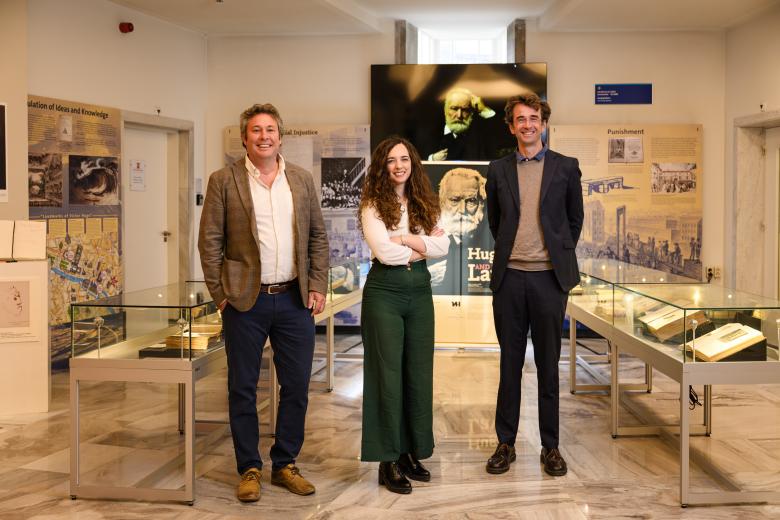
-
Conference on the Human Rights of Future Generations
On 18 & 19 November, Loevestein castle, in collaboration with Maastricht University’s Centre for Human Right and the Lab Toekomstige Generaties (Lab Future Generations), will organise a conference on the human rights of future generations.
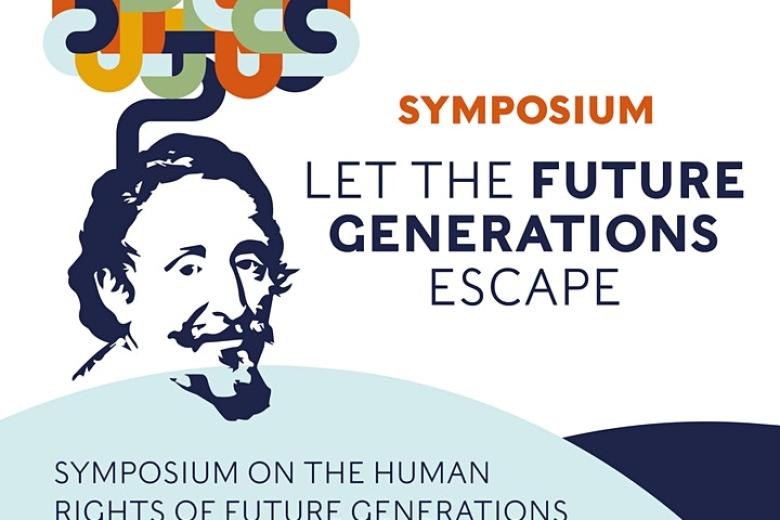
-
Hestia grants for talented UM researchers
The Dutch Research Council (NWO) today awarded a Hestia grant to two researchers, who will receive a UM appointment funded by the ‘Hestia – Impulse for Refugees in Science’ pilot, which was launched in 2018.
